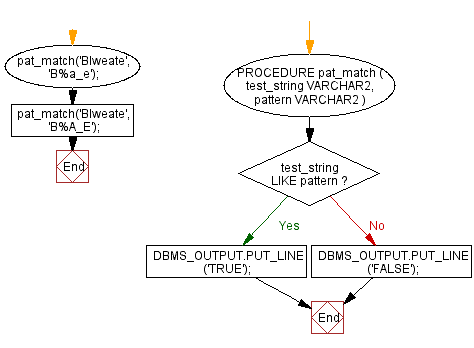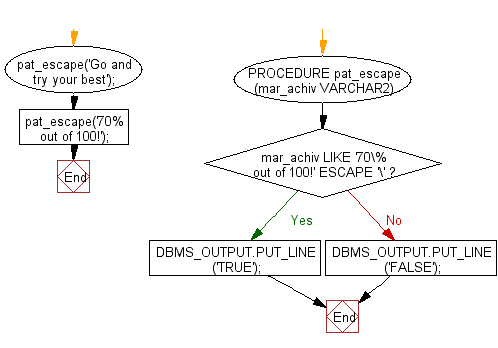PL/SQL Fundamentals Exercises: PL/SQL block to describe the usage of LIKE operator
PL/SQL Fundamentals: Exercise-16 with Solution
Write a PL/SQL block to describe the usage of LIKE operator including wildcard characters and escape character.
In the following example a procedure pat_match with two arguments test_string and pattern compares whether the test_string matching with the pattern and returns TRUE or FALSE according to the matching.
PL/SQL Code:
DECLARE
PROCEDURE pat_match (
test_string VARCHAR2,
pattern VARCHAR2
) IS
BEGIN
IF test_string LIKE pattern THEN
DBMS_OUTPUT.PUT_LINE ('TRUE');
ELSE
DBMS_OUTPUT.PUT_LINE ('FALSE');
END IF;
END;
BEGIN
pat_match('Blweate', 'B%a_e');
pat_match('Blweate', 'B%A_E');
END;
/
Sample Output:
TRUE FALSE Statement processed. 0.00 seconds
Flowchart:

In the following example a procedure pat_escape with the arguments mar_achiv compares whether the mar_achiv containing any percent ( % ) sign or underscore ( _ ) and returns TRUE or FALSE according to the matching. To search for the percent sign or underscore, an escape character ( backslash i.e. '\' ) have to define and put it before the percent sign or underscore. Uses the backslash as the escape character the percent sign in the string does not act as a wildcard.
PL/SQL Code:
DECLARE
PROCEDURE pat_escape (mar_achiv VARCHAR2) IS
BEGIN
IF mar_achiv LIKE '70\% out of 100!' ESCAPE '\' THEN
DBMS_OUTPUT.PUT_LINE ('TRUE');
ELSE
DBMS_OUTPUT.PUT_LINE ('FALSE');
END IF;
END;
BEGIN
pat_escape('Go and try your best');
pat_escape('70% out of 100!');
END;
/
Sample Output:
FALSE TRUE Statement processed. 0.00 seconds
Flowchart:

Go to:
PREV : Write a PL/SQL block to describe the usage of NULL values in equal comparison, unequal comparison and NOT NULL equals NULL comparison.
NEXT : PL/SQL Control Statement Exercises Home.
Improve this sample solution and post your code through Disqus
What is the difficulty level of this exercise?
